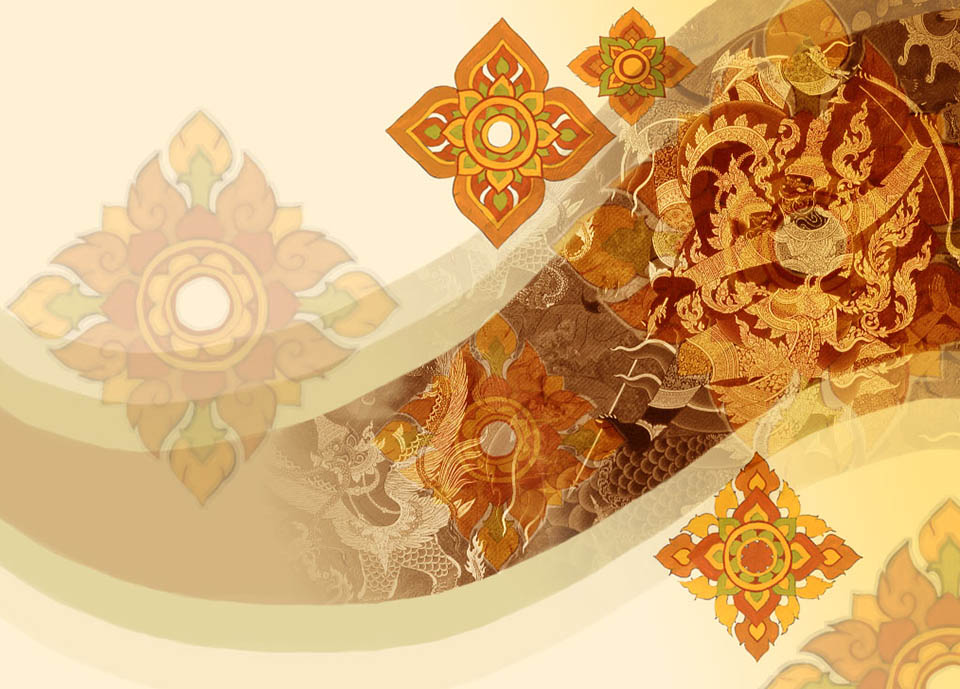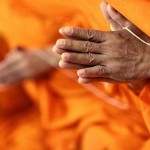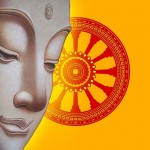Morning Chant – Worshipping the Triple Gem in Thai Buddhism
Morning Prayers are an essential part of Buddhist practice and along with the Evening Prayer combine to provide Thai Theravada Buddhists with a way of both clearing their Negative or Unskilful Acts of the Past, and to develop Future Auspicious Causes of Enlightenment. This Page is intended to Assist Foreign Lay Practitioners, and Potential Candidates for Ordination into the Sangha, to be able to open a Path of Access to the correct method of Chanting Thai Buddhist Morning Prayers, with a correct Understanding of what those prayers mean. Even in Thailand, many Temples are beginning to Chant in both Pali and Thai, because it has become ever more recognized that the benefits of Prayer Chanting are truly at their Utmost when the person Chanting actually Understands the Meaning of what they are saying.
Yo so Bhagavaa Arahang Sammaasambuddho
(To him; the Blessed One, the Accomplished One, the Supremely Self-enlightened One, having extinguished all the flames of desires and becomes rightly enlightened through His own efforts,)
Svaakhaato Yena Bhagavataa Dhammo
(To the teachings of the Blessed One which are well-expounded,)
Supatipanno Yassa Bhagavato Saavakasangho
(And to the disciples of the Blessed One who are well-practiced,)
Tammayang Bhagavantang Sadhammang Sasanghang
(We worship the Blessed One, His teachings and His disciples,)
Imehi Sakkaarehi Yathaarahang aaropitehi Abhipujayaama.
(With these proper offerings, to render supreme homage.)
Saadhu No Bhante Bhagavaa Suciraparinibbutopi
(It is beneficial for us that the Blessed One, having passed away for long but leaving the great benefits behind.)
Pacchimaajanataanukampamaanasaa
(The Blessed One has great compassion to us who are the later generation.)
Ime Sakkaare Duggatapannaakaarabhute patigganhaatu
(May the Blessed One accepts these offerings of ours,)
Amhaakang Digharattang Hitaaya sukhaya.
(For our long-lasting welfare and for our long-lasting happiness.)
Buddhang Bhagavantang Abhivaademi.
(I pay homage to the Buddha, the Awakened and the Blossomed One who is well knowledgeable.)
(prostrate)
Svaakkhaato Bhagavataa Dhammo.
(The teachings of the Buddha are well-expounded.)
Dhammang Namassaami.
(I salute those teachings of the Buddha with joined palms.)
(prostrate)
Supatipanno Bhagavato Saavakasangho.
(The disciples of the Buddha have practiced well.)
Sanghang Namaami.
(I bow down with respect to them.)
(prostrate)
Pubbabhaaganamakaara
Handa mayang Buhagavato pubbabhaaganamakaarang karoma se.
(Now let us pay preliminary homage to the Buddha)
Namo tassa Bhagavato
(Homage to Him, the Blessed One,)
Arahato Sammaasambuddhassa.
(The Supremely Self-enlightened One.)
(repeat 3 times)
Buddhaabhithuti
Handa mayang buddhaabhithuting karoma se.
(Now let us chant in praise of the Buddha)
Yo So Tathaagato Arahang Sammaasambuddho
(He who is the Truth-winner, Having attained Nibbaana, The Supremely Self-enlightened One)
Vijjaacaranasampanno
(The Perfect Embodiment of Wisdom and Virtue,)
Sugato
(the Auspicious Path-finder,)
Lokaviduu
(the Knower of all realms,)
Anuttaro Purisadammasaarathi
(The Incomparable Tamer of individuals,)
Satthaa Devamanussaanang
(The Supreeme Master of devas and men,)
Buddho
(The Awakened One who is Knowledgeable, self-awakened and blossoming by virtue of the Dhamma)
Bhagavaa (Ti)
(The Analyst who knows how to teach Dhamma selectively.)
Yo Imang Lokang Sadevakang Samaarakang Sabrahmakang
Sassamanabraahmaning Pajang
sadevamanussang Sayang Abhinnaa
Sacchikatvaa Pavedesi.
(Any Buddha at all, is one who, With His own most supreme wisdom, shows explicitly the extinguishing of suffering and has taught the world, together with the devas, the maaras, the brahmas, and all groups of living beings including monks and all other human beings so that they all know accordingly the truth about suffering. )
Yo Dhammang Desesi
Adikalyaanang
(So is Dhamma thus explained by any one of the Exalted Ones.
So fine indeed it sounds in the beginnings,)
Majjhekalayaanang
(Fine it is in the middle,)
Pariyosaanakalyaanang,
(And fine it is in the end.)
Saatthang Sabyanjanang
Kevalaparipunnang Parisuddhang Brahanacariyang Pakaasesi
(For it proclaims, by the title and explanation so given, a holy life which consists of a most sublime, pure and perfect way of practice. )
Tamhang Bhagavantang Abhipuujayaami Tamahang Bhagavantang Sirasaa Namaami.
(To that Blessed One, I pay the highest respect. To that Blessed One, I bow my head down with respect.)
(prostrate and recollect the virtues of the Buddha)
Dhammaabhithuti
Handa mayang dhammaabhithuting karoma se
(Now let us chant in praise of the Dhamma.)
Yo So Savaakkhaato Bhagavataa
Dhammo,
(The Dhamma is well-expounded by the Exalted One.)
Sanditthiko
(It is something which one who learns and truly practice will realize by one’s own self.)
Akaaliko
(It is also something which can be actually practiced and yields results without the limitation of time.)
Ehipassiko,
(It is also something worthy of telling the others to take heed of.)
Opanayiko
(And it is something ought to be respectfully observed and adopted.)
Paccattang Veditabbo Vinnuuhi (Ti)
(As it is something that can be only realized through personal experience. )
Tamahang Dhammang Abhipuujayaami
(To that Dhamma, I pay the highest respect.)
Tamahang Dhammang Sirasaa Namaami.
(To that Dhamma, I Bow my head down with respect.)
(prostrate and recollect the virtues of the Dhamma.)
Sanghaabhithuti
Handa mayang Sangahaabhithuting karoma se.
(Now let us chant in praise of the Sangha.)
Yo So Supatipanno Bhagavato Saavakasangho,
(Of good conduct is the community of noble disciples of the Exalted One.)
Ujupatipanno Bhagavato Saavakasangho,
(Of upright conduct is the community of noble disciples of the Exalted One.)
Naayapatipanno Bhagavato Saavakasangho,
(Of right conduct is the community of noble disciples of the Exalted One, who practice in order to know well the Dhamma which frees one from suffering.)
Saamicipatipanno Bhagavato Saavakasangho.
(Of proper conduct is this community of noble disciples of the Exalted One.)
Yadidang
(The noble disciples of the Exalted One are such people namely,)
Cattaari Purisayugaani Attha Purisapuggalaa
(The four pairs of men, the eight of individuals. )
Esa Bhagavato Saavakasangho,
(The community of noble disciples of the Exalted One is:)
Aahuneyyo
(Worthy of gifts,)
Paahuneyyo
(Worthy of hospitality,)
Dakkhineyyo
(Worthy of offerings,)
Anjalikaraniiyo,
(Worthy of reverential salutation, and)
Anuttarang Punnakkhettang Lokassa (Ti).
(Worthy of the incomparable field of merit for the world.)
Tamahang Sangham Abhipuujayaami
(To that Sangha, I pay the highest respect.)
Tamahang Sangham Sirasaa Namami.
(To that Sangha, I bow my head down with respect.)
(prostrate and recollect the virtues of the Sangha)
Ratanattayapanaamagathaa
Handa mayang Ratanattayapanaamagathaayo ceva sanvegaparikittanapaathanca bhanaama se.
(Now let us chant our salutation to the Triple Gem together with the pali passages conducive to spiritual urgency.)
Buddho Susuddho Karunaamahannavo
(The Buddha who is pure-minded, has an ocean-deep compassion.)
Yoccantasuddhabbaranaanalocano
(The Buddha who is pure-minded, has an ocean-deep compassion)
Lokassa Paapuupakilesaghaatako
(And is one who puts into extinction all evils and all defilements of the world.)
Vandaami Buddhang Ahamaadarena Tang
(I join my palms in the gesture of devoted respect to the Bhddha.)
Dhammo Padipo Viya Tassa Satthuno
(The Dhamma of the teacher, glows brightly like a lamp.)
Yo Maggapaakaamatabhedabhinnako
(It is divided into Path, Fruit and Nibbaana)
Lokuttaro Yo Ca Tadatthadiipano
(Which itself transcends the world and shows the way to transcendence.)
Vandaami Dhammang Ahamaadarena Tang
(I join my palms in the gesture of devoted respect to the Dhamma.)
Sangho Sukhettaabhyatikhettasannito
(The Sangha is the greatest of all fields of merits.)
Yo Ditthasanto Sugataanubodhako
(For it is they who, having attained Nibbaana, become awakened just as the Exalted One has done.)
Lolappahiino Ariyo Sumedhaso
(It is they who abandon their defilements of all sorts and become the noble ones with wisdom.)
Vandaami Sanghang Ahamaadarena Tang
(I join my palms in the gesture of devoted respect to the Sangha.)
Iccevamekantabhipuujaneyyakang
Vatthuttayang Vandayataabhisankhatang
Punnang Mayaa Yang Mama Subbupaddavaa
Maa Hontu Ve Tassa Pabhaavasiddhiyaa.
(May any meritorious deeds have I performed in honoring the Triple Gem, which is worthy of veneration, be the power through which all obstacles disappear.)
Sangvegaparikittahapaatha
Idha Tathaagato Loke Upanno
(The Accomplished One has arisen in this world.)
Arahang Sammaasambuddho
(He is one distancing himself from all defilements and becomes Self-entightened.)
Dhammo Ca Desito Niyyaaniko
(And the Dhamma so expounded, is the means to lift one out of suffering.)
Upasamiko Parinibbaaniko
(It is the extinguisher of all cravings, thus paving the path to Nibbaana.)
Sambodhagaamii Sugatappavedito.
(Thus it leads to true knowledge as proclaimed by the Exalted One,)
Mayantang Dhammang Sutvaa Evang Jaanaama,
(Having heard the teaching, we then perceive this:)
Jaatipi Dukkhaa
(Birth is suffering.)
Jaraapi Dukkhaa
(Decay is suffering.)
Maranangpi Dukkhang
(Death is suffering.)
Sokaparidevadukkhadomanas-supaayaasaapi dukkhaa,
(Sorrow, lamentation, physical sickness, mental sickness and despair are suffering.)
Appiyehi Sampayogo Dukkho
(Association with the unpleasant is suffering.)
Piyehi Vippayogo Dukkho
(Dissociation from the pleasant is suffering.)
Yampicchang Na Labhati Tampi Dukkhang.
(Not to receive what one desires is suffering.)
Sankhittena Pancupadaanakkhandhaa Dukkhaa.
(In brief the five aggregates of grasping is suffering.)
Seyyathidang.
(Which are as follows:)
Ruupuupaadaanakkhandho,
(The aggregate forming the basis of clinging is corporeality.)
Vesanuupaadanakkhandho,
(The aggregate forming the basis of clinging is sensation)
Sanyuupaadaanakkhandho,
(the aggregate forming the basis of clinging is perception.)
Sankhaaruupaadaanakkhandho,
(The aggregate forming the basis of clinging is consciousness.)
Vinnaanuupaadaanakkhandho,
(The aggregate forming the basis of clinging is consciousness.)
Yesang Parinnaaya,
(All these are meant to be understood by Buddhist disciples.)
Dharamaano So Bhagavaa,
(The Exalted One, during His lifetime,)
Evang Bahulang Saavake Vineti.
( Frequently instructs His disciples in just this way.)
Evang Bhaagaa Ca Panassa Bhagavato Saavakesu Anusaasanii Bahulaa Pavattati.
(The teachings of the Exalted One are mainly meant for his disciples and are presented as this:)
Ruupang Aniccang,
(Corporeality is impermanent.)
Vadanaa Aniccaa
(Sensation is impermanent.)
Sannaa Aniccaa,
(Perception is impermanent.)
Sankhaaraa Aniccaa,
(Mental formations are impermanent.)
Vinnaanang Aniccang.
(Consciousness is impermanent.)
Rupang Anattaa,
(Corporeality is impermanent.)
Vedanaa Anattaa.
(Sensation is soulless,)
Sannaa Anattaa,
(Perception is soulless.)
Sankhaaraa Anattaa,
(Mental formations are soulless.)
Vinnaanang Anattaa,
(Consciousness is soulless.)
Sabbesankhaaraa Aniccaa.
(All conditioned things are impermanent,)
Sabbe Dhammaa Anattati.
(Both conditioned things and unconditioned things are soulless.)
Te(women:Taa) Mayang Otinnaamha Jatiyaa Jaraamaranena,
Sokehi Paridevehi Dukkhehi Domanassehi Upaayasehi,
(All of us are subjected to: Birth, Decay and death, Sorrow, Lamentation, physical sickness, mental sickness and despair.)
Dukkhotinnaa
(We are being fathomed by suffering.)
Dukkhaparetaa,
(Suffering is what we have in the foremost.)
Appevanaamimassa Kevalassa Dukkhakkhandhassa Antakiriyaa Pannaayethati
(How can the way of ending this suffering be mad known clearly to us?)
Ciraparinibbutampi Tang Bhagavantang Saranang Gataa,
(We all have reached the Exalted One for our refuge though He passed away a long time ago.)
Dhammanca Bhikkhusanghanca,
(Having reached the Dhamma and the Sangha,)
Tassa Bhagavato Saasanang,
Yathaasati yathaabalang
manasikaroma anupatipajjaama,
(We will bear that in mind and practice accordingly the teachings of the Exalted One in so far as our mindfulness and strength will permit us.)
Saa Saa No Patipatti, Imassa Kevalassa Dukkhakkhandhassa
Antakiriyaaya Sangvattatu
(Bring about the extinction of all sufferings.)
For Monks and Novices to Recite
Ciraparinibbutampi Tang
(We all devote ourselves to the)
Bhagavantang Udissa Arahantang
Sammaasambuddhang,
(Accomplisged One who is distancing Himself from all defilements and becomes Self-enlightened, though He passed away a long time ago.)
Saddhaa Agaarasmaa Anagaariyang Pabbajitaa,
(We have gone forth with faith from home to timelessness,)
Tasming Bhagavati Brahmacariyang Caraama,
(Following the Blessed One to practice the holy life,)
BhIkkhuunang
Sikkhaasaajiivasamaapannaa.
(Being fully equipped with the monk’s training rules and livelihood.)
Tang No Brahmacariyang,
Imassa Kevalassa Dukkhakkhandhassa
Antakiriyaaya Sangvattatu.
(May this holy life leads us to the end of this whole mass of suffering.)
(end of morning chants)
Morning Transference of Merit (Gruad Nam)
Devataadipattidaana Gaathaa
Handa mayang devataadipattigaathayo bhanaama se
(Now let us recite the verses on the transference of merit to the devas.)
Yaa Devataa Santi Vihaaravaasinii,
Thuupe Ghare Bodhi Ghare Tahing Tahing,
(Those devas who dwell in the monastery, in the stupa, in the bodhi tree,)
Taa dhammadaanena Bhavantu Puujitaa,
Sotthing Karontedha Vihaaramandhale,
(Those devas we have worshipped with the gift of the Dhamma. May they bring happiness to this monastic area.)
Theraa Ca Majjaa Navakaa Ca Bhikkhavo,
(Monks; those who are seniors, those who are of middle rank, those who are new ordained,)
Saaraamikaa Daanapatii Upaasakaa,
(those who are laymen, laywomen of good breeding and monastic dwellers,)
Gaamaa Ca Desaa Nigamaa Ca Issaraa,
(All householders, villagers, foreigners, countrymen and those who are chieftains,)
Sappaanabhuuta Sukhitaa Bhavantu Te,
Jalaabujaa Yepi Ca Andhasambhavaa,
(may they be happy. All living beings, whether womb-born, egg-born,)
Sangsedajaataa Athavopapaatikaa,
(putrescence-born or spontaneously born,)
Niyyaanikang Dhammavarang Paticca Te.
(May they have the sublime Dhamma leading them beyond the wheel of suffering;)
Sabbepi Dukkhassa Karontu Sankhayng.
(may it bring them to an end of suffering.)
Thaatu Cirang Satang Dhammo
(May the Dhamma of the righteous men last long.)
Dhammaddharaa Ca Puggalaa,
(May people who observe the Dhamma be long-lived.)
Sangho Hotu Samaggova Atthaaya Ca Hitaaya Ca,
(May the monks be harmonized and be ready to bring about suitable things and benefits.)
Amhe Rakkhatu Saddhammo,
Sabbepi Dhammacaarino,
(May the true Dhamma protect us and protect those who observe the Dhamma.)
Vuddhing Sampaapuneyyaama
Dhamme Ariyappavedite.
(May we all be endowed with the prosperity in Dhamma with the noble one has proclaimed.)
Sammaadhaarang Pavecchanto Kale
Devo Pavassatu.
(May the rain come in the right season.)
Vuddhingbhaavaya Sattaanang
Samiddhang Netu Medaning.
(May the rain bring success to the earth for the prosperity of all living beings.)
Maataa Pitaa Ca Atrajang Niccang
Rakkhanti Puttakang,
(Just as a mother and a father regularly shield their own child who was born from them,)
Evang Dhammena Raajaano Pajang Rakkhantu Sabbadaa.
(May the King administer hid people with the royal virtues forever.)
Document is published by www.dharmathai.com for free Distribution Only and is not permitted to be Sold
Editing without Permission or removal of Credits is not Permitted
Credits;
Kritanut Wattana; Text transliteration – please visit his website on Thai Culture; Of Siam
Ajarn Spencer Littlewood; Spell Check and Translation Check
Original Research Source; Buddhist Manual – Morning and Evening Chants (Thai-Pali-English), Translated and Compiled by Associate Prof. Dr. Suchitra Onkom
ISBN 978-974-8480-07-7
first Published to Celebrate the Awarding of Doctorate degree in Buddhist Studies at Maha Julalongkorn University to Luang Por Jaran of Wat Ampawan (Singhburi).
The aim of the book was to enable Foreigners to be able to Chant Buddhist Prayers when attending Thai Theravada Buddhist Practice Centers and Temples, both in and outside of Thailand



